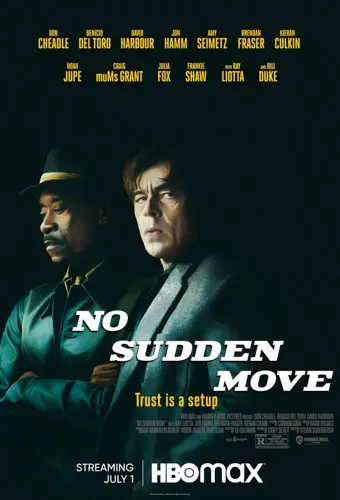

It’s the moment that then launches Kimi into an inevitable chase (for what is a film such as this without a chase?), anxiety edged up a few notches by Kravitz’s believable unease with being back in the wide world. This crescendoes rather brilliantly in a standout scene involving Angela leaving her enviable apartment (the size of which is perhaps one of the film’s more hard-to-stomach elements) for an uncomfortable meeting with her employers, personified by an ingeniously cast Rita Wilson, subverting her wide-smiled cheeriness to chilling effect. Koepp isn’t trying to make larger Ted Talk points about big tech – there’s really no time for that – but with light jabs, he provides a rather bleak state of the union with regards to issues of privacy and corporate morality. The inclusion of a more evolved Amazon Echo is handled with a deftness that’s been missing from other recent-ish examples of voice AI movies, from the schlocky Netflix thriller Tau to the comedy disasters Jexi and Superintelligence, its role here rising far above mere gimmickry. Like Soderbergh’s other late-stage thrillers, from Contagion to Side Effects to Unsane to the miniseries Mosaic, Kimi firmly exists in a real-world setting with real-world rules, and although lightly etched, it’s a rare tech thriller that doesn’t unintentionally slip into science-fiction. We know where films like this tend to go, and Kimi is light on genuine surprise, but Koepp and Soderbergh keep most of it grounded, avoiding the clumsy narrative leaps these films often resort to, making so much of it feel awfully credible. It’s no surprise, after an opening tease concerning the financial specifics of the company behind Kimi, that there’s a conspiracy to unravel but it unravels with a quick ease, an age-old tale of the hero who saw too much and the villain who wants to keep them quiet. In a sleek 89 minutes, writer David Koepp (whose similarly contained thriller Panic Room was notably watched by Soderbergh twice last year) keeps things refreshingly simple and stringently devoid of any extraneous padding.

But when Angela hears something sinister on a flagged Kimi stream, her safe, insulated world is suddenly in disarray. The pandemic has set her anxieties back and she refuses to go outside despite an over-the-road neighbour (comedian Byron Bowers) trying to tempt her on a date. Zoë Kravitz’s agoraphobic Angela (perhaps a reference to The Net’s similarly named hacker) spends her days listening to such audio, quarantining herself from the world as Covid rumbles on.

A large scattered team of operatives sift through the many interactions between users and machines to perfect the dynamic, ensuring that miscommunication is kept to a minimum. Kimi is the name of an Alexa-style device with a key USP: people.


 0 kommentar(er)
0 kommentar(er)
